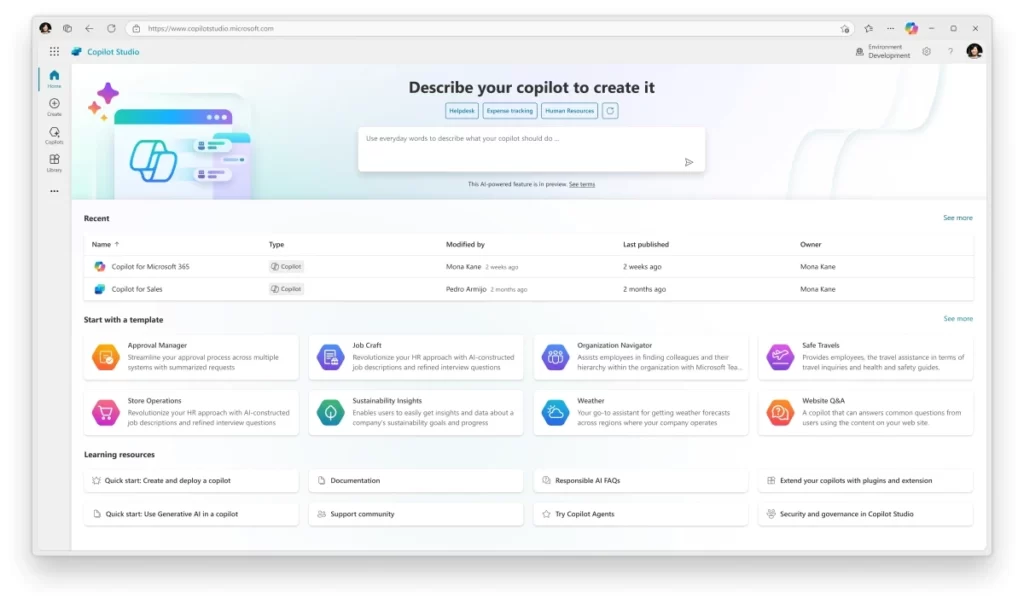Microsoft Copilot Gets Custom AI Agents at Build 2025

Microsoft Copilot revolutionizes business workflows, with experts projecting 1.3 billion AI agents by 2028. This forecast emphasizes an extraordinary growth path as companies welcome customizable AI assistants to improve productivity and drive innovation.
Microsoft Copilot’s AI capabilities through Copilot Studio now serve 230,000 organizations, including 90% of Fortune 500 companies. The platform’s development continues with Copilot Tuning, which lets enterprise customers build custom models without coding. Companies can now train AI agents with their internal data while they retain control over privacy standards.
Build 2025’s major announcements reveal how Multi-Agent Orchestration technology makes shared networks possible between individual agents. The platform’s developer tools, including Azure AI Foundry with its 1,900+ models, continue to expand. Microsoft’s vision for an “open agentic web” sets new standards to change how people interact with technology.
Microsoft unveils customizable AI agents in Copilot Studio

Microsoft showed major improvements to Copilot Studio at Build 2025. The platform now puts powerful AI agent creation tools in everyone’s hands, not just technical experts. This move strengthens organizations to build sophisticated AI agents without deep coding knowledge.
Copilot Studio enables low-code agent creation
Copilot Studio has grown into a graphical, low-code platform that makes AI agent development accessible throughout organizations. Users describe their desired agent in plain language and set specific instructions. They connect knowledge sources without needing data scientists or developers. Both technical and non-technical users can create AI-powered assistants that streamline processes.
“With Microsoft Copilot Studio, we have an effective platform for delivering the benefits of generative AI to our customers, providing them with faster service and an even better overall cruise experience,” notes Scott Petit, Sr. Director at Holland America.
The platform provides several practical ways to create agents:
- Using pre-built agent templates to jumpstart business value
- Making use of existing knowledge with Azure AI Foundry Search Index
- Building agents directly within Microsoft 365 using natural language
230,000+ organizations already using the platform
Copilot Studio’s adoption has soared. More than 230,000 organizations—including 90% of the Fortune 500—now use the platform to build AI agents and automations. These custom agents deliver real results. One organization reports its agent handles 60% of incoming queries. Employees gained over 21,000 hours of productivity while incoming service tickets dropped by 27%.
Companies of all sizes share success stories about their Copilot Studio implementations. Virgin Money sees it as “an enabler for us to create great customer experiences.” Nsure.com reports their agent can “handle around 60% of customer questions and, with our next release, that number will go up to 90%”.
Multi-agent orchestration allows agents to cooperate
The most innovative announcement focuses on multi-agent orchestration. Agents can now share data, work together on tasks, and split work based on their expertise. Organizations can build connected multi-agent systems where agents delegate tasks to one another, rather than using a single agent or managing isolated agents.
One example shows multiple agents working together across HR, IT, and marketing departments to help onboard new employees. A Copilot Studio agent pulls sales data from a CRM system and hands it to a Microsoft 365 agent. The agent drafts a proposal in Word and triggers another to schedule follow-ups in Outlook.
This orchestration capability connects agents built with Microsoft 365 agent builder, Azure AI Agents Service, and Microsoft Fabric. The result brings better connectedness, intelligence, and scale to business processes.
Copilot Tuning lets enterprises personalize AI workflows
Microsoft unveiled Microsoft 365 Copilot Tuning at Build 2025. This most important advance lets companies create individual-specific AI experiences with their own data. Companies can now customize Microsoft Copilot to match their business needs.
No-code customization using internal company data
Copilot Tuning opens up AI model customization with a low-code approach that doesn’t need technical expertise. Companies can train AI models with their own data, workflows, and processes without much technical help. Non-technical users can now access advanced AI personalization through:
- Simple data selection using files stored in SharePoint
- Automated data ingestion and processing
- Pre-defined task templates for common business scenarios
The system uses an innovative data collection method. Subject matter experts can clean an entire dataset by labeling less than 10% of its contents. The platform also provides three pre-built “recipes” that focus on specific tasks: Expert Q&A, Document Generation, and Document Summarization.
Examples from legal, healthcare, and retail sectors
Copilot Tuning creates opportunities in a variety of industries. Legal firms can build agents that mirror their style and expertise. These agents automate document creation and draft arguments by combining company knowledge with client context. Consulting companies can adapt agents to specific industries based on their expertise.
Several organizations already test the technology. Ernst & Young, Canadian law firm McCarthy Tétrault, and US agricultural cooperative Land O’Lakes lead the way. These early users create customer service knowledge agents, proposal writers trained on successful RFPs, and project analysts that handle large document volumes.
Microsoft ensures data privacy and security
Privacy is a life-blood concern with Microsoft Copilot customization. All agents and data work securely within Microsoft 365’s service boundary. Microsoft clearly states they don’t use customer data to train foundation models.
The system keeps access control lists linked to training data. It automatically checks if data access permissions match model usage permissions. Microsoft also extends Purview Information Protection to Copilot Studio agents that use Microsoft Dataverse to improve data security and stop leaks.
Microsoft expands developer tools for building AI agents
Microsoft’s Build 2025 revealed a bigger toolkit for developers who create AI agents. The company made major improvements to their development platforms.
Azure AI Foundry supports 1,900+ models including Grok and Llama
Azure AI Foundry’s model catalog has grown by a lot to over 1,900 models. The platform now directly integrates Grok 3 and Grok 3 mini from xAI. This vast collection includes foundation models, reasoning models, small language models, and domain-specific solutions from Microsoft, OpenAI, Meta, Mistral, and Hugging Face. Developers can now use full fine-tuning features, including LoRA/QLoRA and DPO to customize models for their business needs.
10,000 organizations use Azure AI Foundry to build context-aware agents with their data. These organizations include Heineken, Carvana, and Fujitsu.
GitHub Copilot evolves into autonomous coding agent
GitHub Copilot has changed from an in-editor assistant to an autonomous coding agent. The new agent works on its own when it gets GitHub issues and:
- Spins up a virtual machine and clones repositories
- Analyzes codebases using retrieval augmented generation
- Pushes changes to draft pull requests
- Provides detailed reasoning in session logs
The coding agent uses Model Context Protocol (MCP) to access external data and features, including visual content in issues. After making changes, it tags users for review and handles any follow-up comments on its own.
Windows AI Foundry offers unified platform for local and cloud deployment
Windows AI Foundry is the next step in Windows Copilot Runtime’s development into a unified platform for local AI development. The platform detects device hardware—CPU, GPU, and NPU—and gets the software components needed to run models.
The platform merges Foundry Local for Windows and Mac. This allows cross-platform apps to work offline while keeping data private. Developers don’t need to package ML components with their applications because of the built-in Windows ML runtime.
Entra Agent ID and Purview enhance agent governance
Microsoft Entra Agent ID, now in preview, gives unique identities to agents created in Microsoft Copilot Studio and Azure AI Foundry. This gives you control similar to managing human users. Microsoft Purview’s new SDK extends data security controls to custom-built AI applications. This helps prevent data oversharing and makes compliance management easier.
Microsoft pushes vision of the open agentic web
Microsoft showed an ambitious vision for an “open agentic web” at Build 2025. This ecosystem will let AI agents combine smoothly and cooperate across platforms and services.
Model Context Protocol (MCP) gains broader support
Microsoft’s agentic web strategy’s life-blood involves delivering first-party support for Model Context Protocol (MCP) throughout its agent ecosystem. MCP acts as the “USB-C port of AI applications” and provides a standard way for AI models to connect with various data sources and tools.
Microsoft has joined the GitHub team on the MCP Steering Committee to advance this open protocol’s secure adoption. The company added two important contributions to the MCP ecosystem:
- A new authorization specification that lets users use existing sign-in methods for agent access to data services
- A new MCP server registry service to implement centralized repositories of MCP server entries
This move toward standardization mirrors how the internet itself grew through open protocols. Major AI providers like OpenAI and Google DeepMind have also committed to supporting MCP in their models.
NLWeb introduced as HTML-equivalent for AI agents
Microsoft also launched NLWeb as the HTML equivalent for the agentic web. This new open project helps websites provide conversational interfaces where users interact with web content using natural language.
Each NLWeb endpoint works as an MCP server. This lets websites make their content easy to find by AI agents. The standard helps avoid vendor lock-in and gives developers more control over how their agents communicate, authenticate, and get content from the web.
Microsoft Discovery aims to accelerate scientific breakthroughs
Microsoft Discovery stands out as an enterprise agentic platform that will revolutionize scientific research. The system showed its power by screening 367,000 potential candidates for a data center coolant in just 200 hours.
Microsoft’s quantum team used AI to screen over 32 million materials for battery technology that could cut lithium needs by about 70%. Scientists can now complete years of lab work in days or weeks without writing code.
AI tools available to non-technical
Microsoft’s Build 2025 announcements mark a defining moment for AI agent technology without doubt. The company has positioned itself as a leader in this emerging field with its detailed approach to agent creation, customization, and collaboration. The expansion of Copilot Studio makes powerful AI tools available to non-technical users, while Azure AI Foundry’s massive model catalog enables developers with unprecedented flexibility.
Most importantly, Microsoft’s vision goes way beyond the reach and influence of individual product enhancements. The company imagines an interconnected ecosystem where AI agents work together across platforms through standardized protocols. This transformation moves away from isolated AI assistants toward collaborative agent networks that tackle complex tasks through coordinated effort.
Microsoft’s steadfast
Multi-agent orchestration represents a significant step toward this future. Organizations can now deploy specialized agents that exchange information and distribute workloads based on their unique capabilities instead of relying on a single AI assistant. The emphasis on open standards like Model Context Protocol and NLWeb shows Microsoft’s steadfast dedication to building an available AI ecosystem rather than a walled garden.
These innovations suggest Microsoft’s strategic direction even in early development stages.
democratizing AI agent creation while building strong infrastructure for an interconnected “agentic web.”
This trajectory will reshape the scene of how businesses operate, scientists find new discoveries, and users interact with technology over the last several years.

